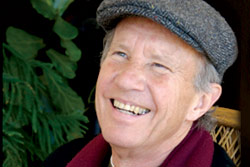As far as we know, humans have always been big on miracles. Always big on believing that more is possible than what we were taught. More than what we have experienced. More than we logically assume. We humans have consistently wanted to believe that sometimes things happen that are outside the laws of nature. (Assuming, of course, that anyone understands all the laws of nature.) Some folks call these miraculous happenings, "acts of God." Some refer to them as, "unexplained phenomena." Asheville "La-la's" — or those who spent too much time in the '60s — might call them, "alien-induced," "cosmic-mind-controlled" or "vortex spin-offs."

The truth, of course, is that we understand very little of life that goes on around and within us each and every moment. We say that we're alive because our heart pumps blood and our lungs pump air. But, as anyone who has been through 7th-grade science knows, millions of other processes have to be constantly happening to even keep us upright. Much less conversant, cognitive, cool and cocky. A case could be easily made that each of us and each part of us — from goatee to gonad to goober — is pure miracle. Each of us, a walking, talking miraculous goofball.
During the winter holidays, lots of folks in Western culture celebrate miracles: Jews celebrate the miracle of an oil lamp that burned eight days on less oil than it takes to sauté an anchovy. They call this celebration Hanukah. Christians celebrate the miracle birth of a baby god who was conceived without benefit of man or sperm. They call this Christmas. Wiccans celebrate the miraculous return of the sun to the higher sky on the Solstice. Folks of African heritage celebrate the miracle of home, love and community and call it Kwanzaa. Almost everybody celebrates the miracle of a new calendar year and the miraculous possibilities that lie in store.
And Christians, with Epiphany, celebrate three pagan astrologers who followed a star to find who they thought would be "King of the Jews," but, was actually a very humble baby named Jesus.
So many miracles to celebrate. So little time.
But whether you buy into all of these, one of these or none of these holiday miracles, if you want to see a miracle, just take a walk in downtown Asheville during the holidays. Twenty years ago, Asheville was a ghost town. Empty at night. Depressing at best. It's true! Take a walk now some evening and see the party animals at the Flying Frog in the Haywood Park Hotel, or have a jalapeno hors d'oeuvre at Chorizo in the Grove Arcade. Those venues were boarded up just a few years ago. Check out the dozens of street musicians and performing artists on every corner these evenings. Stick your nose in one of the dozens of art galleries, cool shops and music listening rooms; and be aware that not so long ago, none of this stuff was happening. None of it.
You can draw a distinction, if you like, between "religious" miracles and "community" miracles. You can say one is holy and the other is human. But miracles are miracles. And sometimes, communities are the best vehicles for the miraculous.
Maybe, just maybe all of these miracles (human/religious, ancient/contemporary) point to something beyond themselves. Maybe each of these holy and human phenomenon holds up a wise, ancient finger pointing to the stars, to the galaxies, to the oceans and rivers, to the mountains, to the jet stream and Gulf Stream, to our hearts, to our DNA, to love.
Perhaps each of these ancient – and not-so-ancient — stories are there to be celebrated as a reminder that we are all part of a miracle story. A grand and gory, glorious and ghastly story. A story of crushing pathos and irrepressible joy. A story of blunder and wonder, each and all miraculous. A marvelous story. A mystical story. A wonder-full story.
These human/holy miracles just might be celebrated each year, to remind us that we are all acts of God. We are all unexplained phenomenon. We are oily, home-loving, star-following, light-shining, beer-guzzling, street-dancing miraculous goofballs who were conceived, gestated and born in a most mind-blowing way. We are walking, talking miracles living in a world that no one and nothing – not even science – can explain.
"There are two ways to live your life," quoth Albert Einstein. "One is as though nothing is a miracle; the other, as though everything is a miracle." Happy Holy Days!
[Founder and Minister of Ritual of the Jubilee! Interfaith Community in Asheville, Howard Hanger is also the headmaster of the private all-girls school Hanger Hall, an author and a jazz musician.]



Common misconception- That Kwanzaa comes from Africa. It was developed in America in 1966 and is celebrated mainly in the United States, but not in Africa. What do Africans (in Africa) do for the holidays? Just curious.
Thank you, Howard Hangar, for perspective writ large. Quite lovely.
Thanks for that, Howard. Wishing you a truly Jubilant 2010!